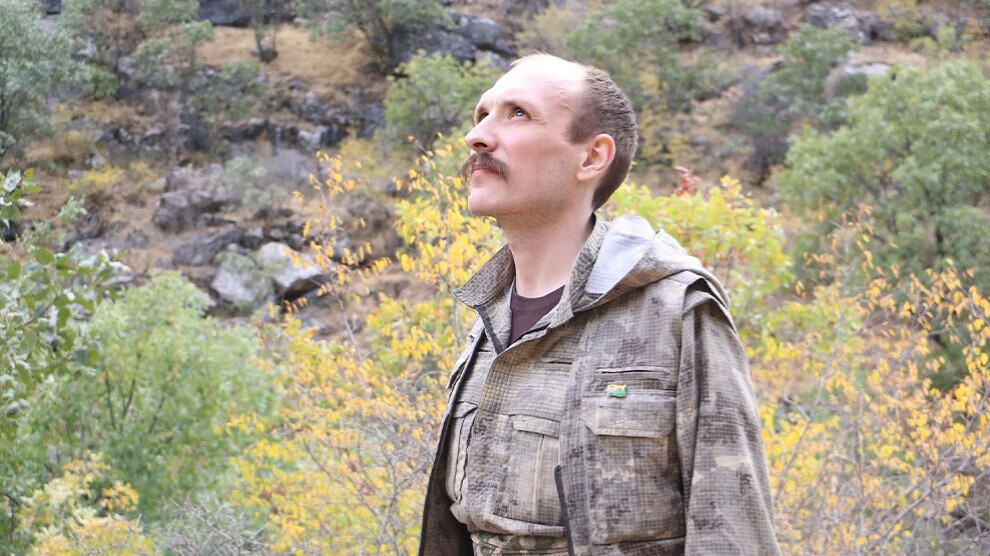Baran Nûjiyan: "Let people rediscover humanity"
“A social revolution is about letting people rediscover humanity. What have we lost as humanity in over 5,000 years of history? Where have values been lost? How do we find our way back to them?”
“A social revolution is about letting people rediscover humanity. What have we lost as humanity in over 5,000 years of history? Where have values been lost? How do we find our way back to them?”

In the second part of the interview series for the "Şervanên Azadiyê" format, the German-Portuguese guerrilla fighter Baran Nûjiyan describes life in the mountains of Kurdistan.
It is a place that serves to get to know life and one's own personality, he says. With the importance of self-discovery, the beauty of life and the value of knowing that the mountains are a place where countless friends fight together. "It's a new way of interacting, a new way of fighting together. It is a new form of relationship that we are living – always aimed at strengthening and giving strength to the other person.”
Finding within ourselves what connects us with everyone else – in liberal societies like that of central Europe, the basis is missing. Baran Nûjiyan sums up: “In my life I could watch how this development continues to multiply: That we can no longer tell the truth to each other. We can't tell each other what we think, we flee from arguments. The course here is honest dealing. Because we have a common goal and a common interest to bring this revolution forward. Therefore, we also have a common interest in strengthening our friends. If we see flaws in them, if we see weaknesses in them, we can address them openly. Because we have a base on which our community rests. That's what's missing in Central Europe: the common basis and the common values that we stand for. Values of humanity, which in my upbringing were always robbed of their content, never quite clear and diffuse. Everyone may have their own interpretation, but I got to know really strong values here, which are also filled with content and meaning practically in life.”
Baran Nûjiyan looks back on his arrival in the mountains of Kurdistan three years ago. But if he had known beforehand what life is like here, he wouldn't have set out on his own. "One sits here and knows: We are taking steps here that are an answer to the question and the problems that thousands feel exposed to. Of course, one then has an interest in making it tangible and understandable. And of course it is also the case that we are far away from reality. This life is very far removed from life in the metropolises of Central Europe. It's about, and that's the approach; bringing about changes not only through gross changes in the power structures, but through the takeover of a state or the like. A social revolution is about letting people rediscover humanity. What have we lost in humanity in over 5,000 years of history? Where have values been lost? How do we find our way back to them, that is, to our naturalness? That's what it's all about."
Of course he wants to share this happiness with others, Baran Nûjiyan continues. “In the mountains you meet every kind of nation and every kind of language is spoken. That confirms somewhere exactly what it's about: the democratic nation, peaceful coexistence and the joint struggle for freedom of people from the most diverse backgrounds, who come together here and, in respect of differences, develop a common strength, the value of diverse views.”
Baran Nûjiyan reminds predecessors from different countries who joined the fight in the mountains of Kurdistan in the 1990s and left a legacy. Internationalist fighters, countless from Germany alone, who gave their lives in the resistance and opened the way. “That's when we learn that it's possible to join this fight. When I first heard about the revolution in Rojava and slowly got to know the movement, the first question and consideration was: Where can I find my role and can I find a role at all? Can I just be a spectator from afar? This is what was made possible largely through the work of friends who left before me. To know that we can go, we can be part of this, we can play a role.”
Great examples have been set. People like Andrea Wolf (Ronahî), Michael Panser (Bager Nûjiyan), Jakob Riemer (Şiyar Gabar), Sarah Handelmann (Sara Dorşîn), who fell in the mountains, and others who lost their lives in the war for Rojava and opened a new way for us. "This also shows one's own responsibility to continue this fight and to continue the work that the friends started," says Baran Nûjiyan.
This with the general handling as a basis to lead a common fight. "It's not about becoming a system for the search for individual satisfaction or individual happiness. It is about a common goal and about becoming part of the common struggle as an individual. And to become one.” He feels an obligation towards the fallen. "They gave meaning to the struggle with their lives and our job is to continue that. There are also countless friends that we take as an example, with their characters and the marks they have left everywhere. You always take an example from them. You want to do justice to this fight.”